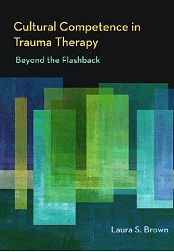Cultural Competence in Trauma Therapy: Beyond the Flashback

“Cultural Competence in Trauma Therapy: Beyond the Flashback”
By Laura S. Brown
American Psychological Association
Washington, D.C. 2008
Author links trauma to culture in groundbreaking work
Reviewed By Paul Efthim, Ph.D.
Seattle psychologist Laura Brown, a master therapist and pioneer in the field of ethics, boundaries and feminist psychotherapy, has released an outstanding book that addresses a significant gap in what we know about trauma treatment.
At a time of excessive emphasis on the technical aspects of therapy, Brown argues persuasively that cultural competence is essential to delivering good treatment.
Brown begins the book by linking trauma and culture: “Trauma and its psychic aftermaths have a texture. The experience conveys meanings that derive from personal histories; cultural heritages; and the social, political, and spiritual contexts in which the painful event happens. Even such an apparently neutral trauma as a natural disaster or a car accident can have a complex and multidetermined meaning structure, because the emotional impact of trauma is not merely about what happened in the moment but also reflects what occurred before and what transpires next.” The therapist’s job is to understand how a survivor’s multiple contexts and identities shape their experience of and recovery from trauma.
She defines “culture” broadly, including a wide range of multiple identifications including but not limited to ethnicity, age, sexuality, spirituality, religion, disability status and social class location. This is a welcome shift from old approaches to cultural competence in therapy which lumped people into subgroups and then listed how the subgroups differ from each other.
In Part One, the author thoughtfully reviews some common approaches for working with trauma and discusses how cultural competence might inform treatment. Brown is masterful in her ability to explicate the subtle features of defining what is a trauma – such as the issue of micro aggressions in the context of racism and sexism.
Part Two tackles specific contextual paradigms for understanding the nature of trauma. Here again, Brown’s ability to integrate feminist, psychodynamic and political perspectives brings these key questions alive. For example, she examines her own cultural background and the manner in which her own privilege affects her ability to understand her patients’ experience.
The last part of the volume is a brief look at how trauma affects families of trauma survivors and how it affects psychotherapists.
A primary strength of this text is its explicit focus on the role of power in trauma and cultural experience. Brown uses a feminist lens throughout the book: “Because one core aspect of how trauma functions as a source of psychic wounding is that trauma induces powerlessness and loss both of real control and self-protective illusions of control, a theory of therapy that centers its attention on power is likely to have much useful to say to its practitioners and others about trauma.”
Brown thinks critically and asks difficult questions about assumptions that are taken as truth in dominant culture, including the culture in which much psychological discourse takes place. Accordingly, the book can be unsettling at times. Brown expresses her hopes that readers will come away feeling both “ignorant and inspired.” We are reminded that rediscovering and owning what we don’t know can lead to much deeper understanding in our work with others and ourselves.
This groundbreaking book is highly recommended and deserves a wide readership.
Paul Efthim, Ph.D. is a licensed psychologist in private practice in Brookline, Mass. and holds a faculty appointment at the Boston Institute for Psychotherapy.
Learn more about the book: Cultural Competence in Trauma Therapy: Beyond the Flashback
